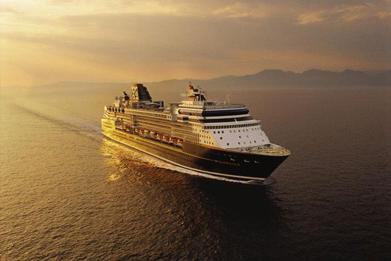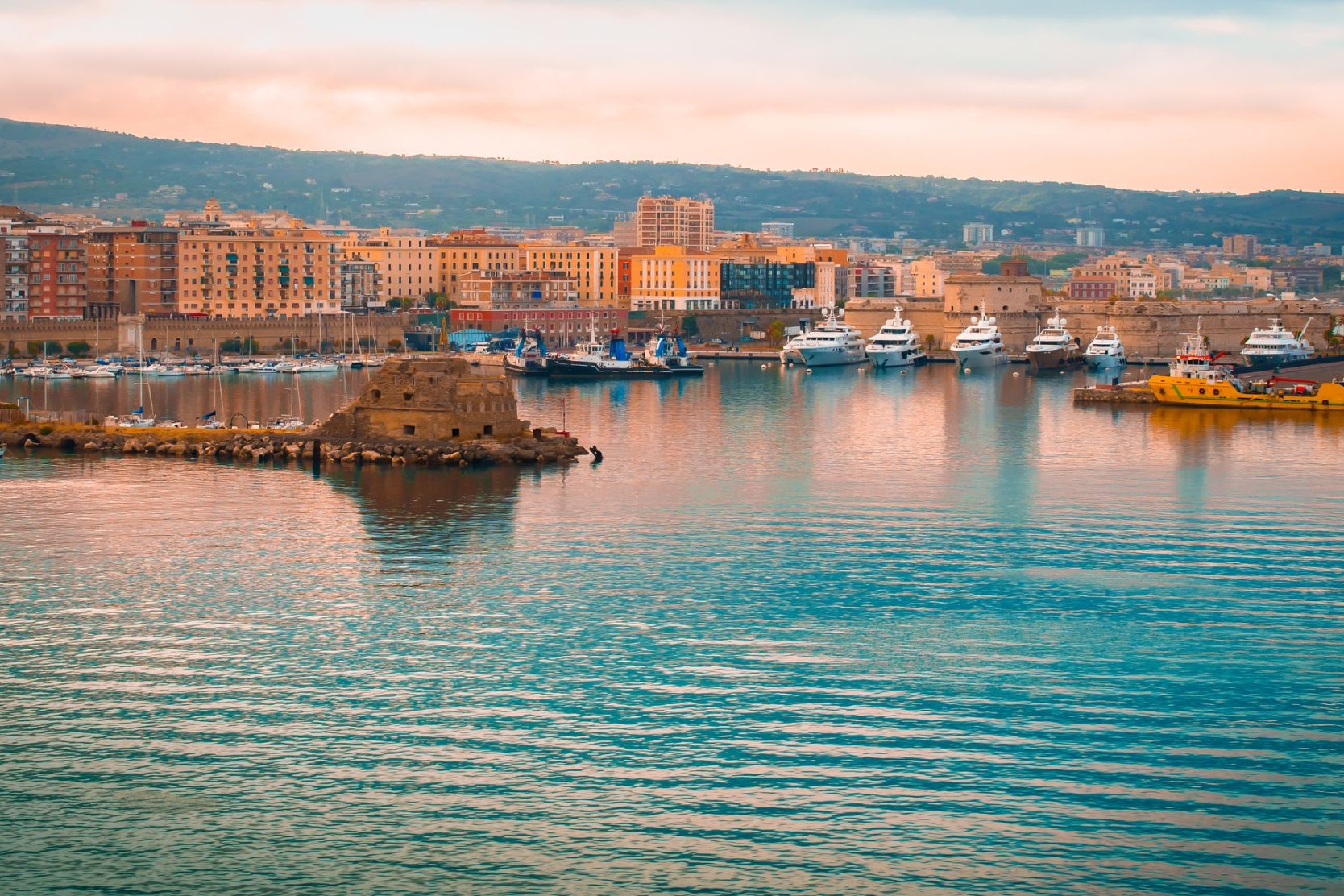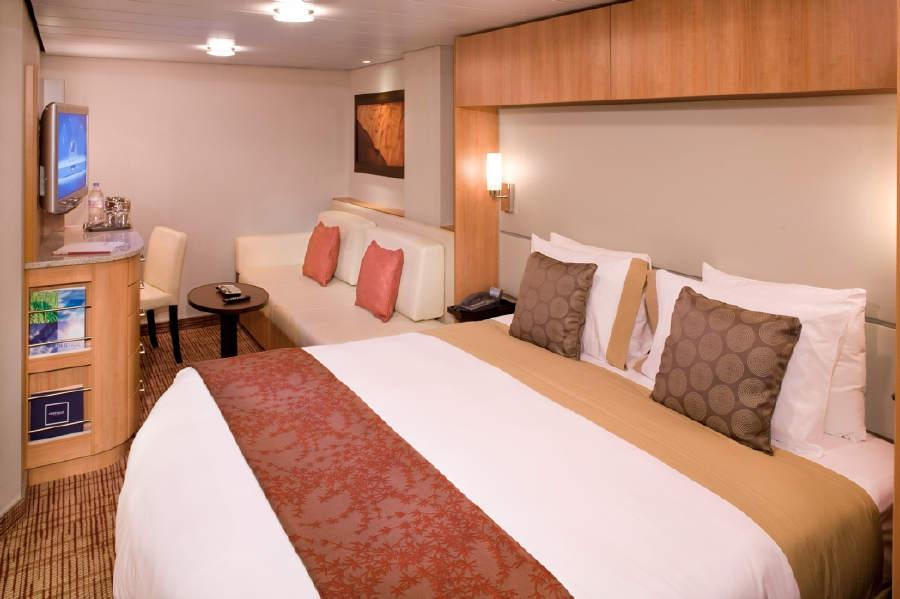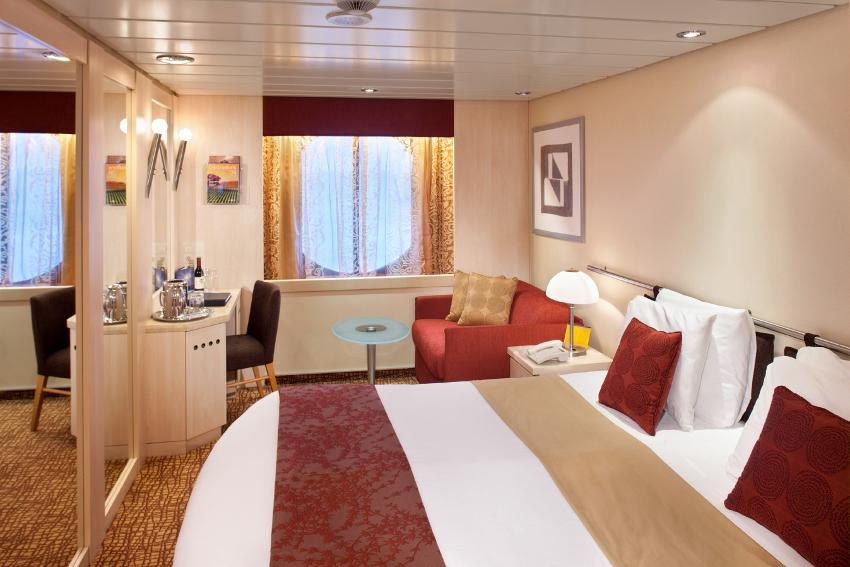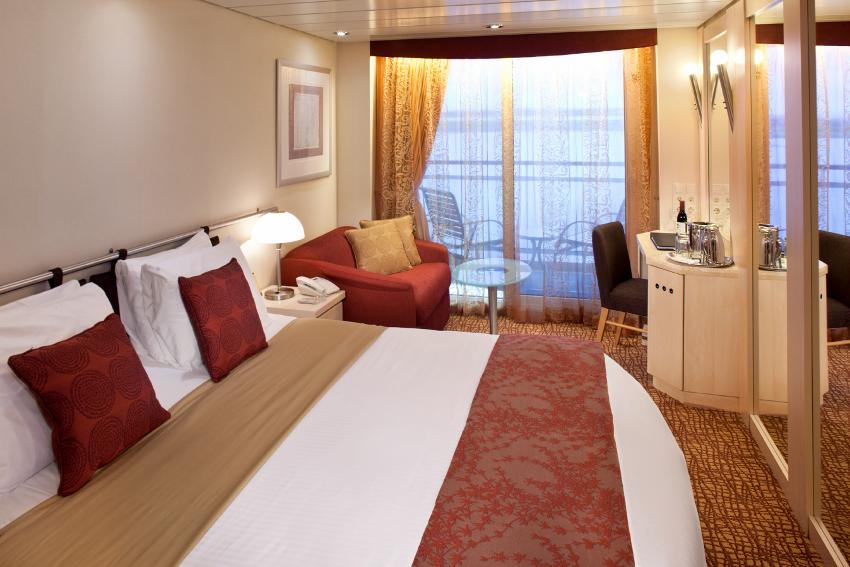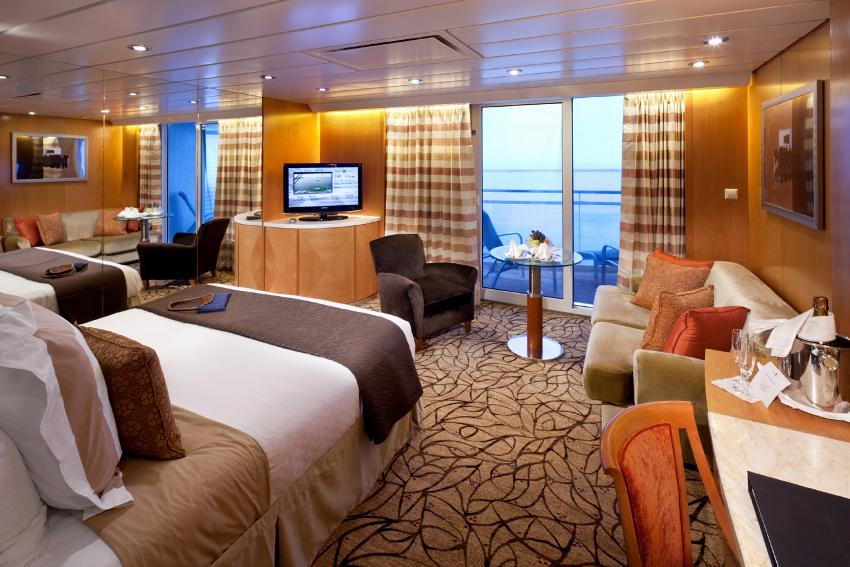Cruise: 30,877,035
16 nights, from Civitavecchia Rome
| Cruise Region : Transatlantic cruises, Mediterranean Sea |
| Company : Celebrity Cruises |
| Ship : Celebrity Constellation |
| Journey Start : Fri 31 Oct 2025 |
| Journey End : Sun 16 Nov 2025 |
| Count Nights : 16 nights |
Schedule
| Day | Date | Port | Arrival | Departure |
|---|---|---|---|---|
| 1 | 31.10 Fri | Rome (Civitavecchia) / Italy | 17:00 | |
| 2 | 1.11 Sat | Day at sea / Sea | ||
| 3 | 2.11 Sun | Cartagena (Murcia) / Spain | 09:00 | 17:00 |
| 4 | 3.11 Mon | Málaga / Spain | 08:00 | 17:00 |
| 5 | 4.11 Tue | Day at sea / Sea | ||
| 6 | 5.11 Wed | Day at sea / Sea | ||
| 7 | 6.11 Thu | Ponta Delgada, Fr. San Miguel; Azores Islands / Portugal | 08:00 | 17:00 |
| 8 | 7.11 Fri | Day at sea / Sea | ||
| 9 | 8.11 Sat | Day at sea / Sea | ||
| 10 | 9.11 Sun | Day at sea / Sea | ||
| 11 | 10.11 Mon | Day at sea / Sea | ||
| 12 | 11.11 Tue | Hamilton / Bermuda | 08:00 | 16:00 |
| 13 | 12.11 Wed | Day at sea / Sea | ||
| 14 | 13.11 Thu | Day at sea / Sea | ||
| 15 | 14.11 Fri | Nassau / Bahamas | 07:00 | 15:00 |
| 16 | 15.11 Sat | Day at sea / Sea | ||
| 17 | 16.11 Sun | Tampa / USA | 06:00 |
Accommodation in a cabin of the selected category;
All-inclusive meal (except for alternative restaurants);
Used drinks: water, tea, coffee at self-service points on the liner;
All public entertainment on board (evening shows, night clubs, live music, etc.);
Participation of children in children's clubs;
Visiting pools and jacuzzis;
Gym, sports court, group classes;
Cabin service;
Port charges, fees and taxes;
For the category of Retreat cabins (suites) - Ultra all inclusive:
All the above services are included;
Robes for use on board;
Premium drinks package;
Premium Wi-Fi.
Аdditionally paid
air travel;
transfers;
visas along the route;
hotel before and after the cruise (if necessary);
tips for staff*;
alternative restaurants;
alcoholic and some non-alcoholic drinks;
Internet and telephone on board;
casino on board;
laundry/dry cleaning services;
beauty salon, SPA center;
excursions in ports (optional).
*The size of the tip depends on the chosen cabin category:
(inside cabin, with window, with balcony, Infinity Veranda) cost $18.00 per guest per day,
for Concierge and AquaClass cabins $18.50 per guest per day,
and for suites - $23.00 per guest per day.
The cost of the tip is automatically added to the final invoice. If you pre-pay a tip when booking a cruise, the tip will not be reflected on your final onboard bill.
CELEBRITY CRUISES DRINK PACKAGES
There are both alcoholic and non-alcoholic cruise packages to suit every taste.
The new All Inclusive package comes with the Classic Beverage Package, which allows you to enjoy unlimited water, beer, cocktails, frozen drinks and draft wines up to $10 per serving. The Classic Beverage Package also includes a 15% discount on all bottles of wine.
Premium Beverage Packages include all the options available in the Classic Beverage Packages, plus premium coffee, fresh juices, bottled and canned juices, San Pellegrino, Red Bull, Vitamin Water, Fair Trade Iced Tea, Craft and Artisan Beer, Premium Liquors, Coke. Cokes, premium bottled water, draft wines up to $17 and 20% off bottled wine.
Classic Package
With the Classic Package, you can choose from an incredible selection of beers, spirits, cocktails, liqueurs, frozen drinks and draft wines up to $10 per serving. You also get 15% off all bottled wines. The Classic Package starts at $89 per day.
Premium Package
Starting at $109 per day, the Premium Package includes signature coffees and teas, craft and artisanal beers, spirits, cocktails, frozen drinks, Coca-Cola products, premium bottled water and wines by the glass up to $17 per serving. You also get 20% off all bottles of wine.
*All Inclusive package must be selected, which includes Classic Beverage Package, Basic Internet Package, and gratuities, and is valid within AquaClass® staterooms, except Galapagos. All guests in the stateroom must select the same pricing package.
Zero Proof Beverage Package
The Zero Proof Drink Package is $30 per day. This package covers all your essentials, such as fresh juices, premium coffee and tea, and bottled water.
Depending on the cruise date, to confirm the cabin, you must make a payment according to the schedule.
After making the prepayment, the manager confirms the application in the cruise system.
Deposit (prepayment)
Cruise duration 1-5 nights - 100 USD / person
6 or more nights - 450 USD / person
Full payment no later than 60 days before the start of the cruise
Full payment (cruises in the period December 24-31) no later than 90 days before the start of the cruise
Standard Penalties for Celebrity Cruises
Cancelation Period Cancellation Policy
90-61 Days Prior to Arrival
1-5 Nights $35/person
6 Nights or more $70/person
60-46 Days Prior to Arrival In the Amount of Deposit
45-31 Days Prior to Arrival 25% of the Full Cruise Cost, but no less than the Deposit
30-15 Days Prior to Arrival 50% of the Full Cruise Cost, but no less than the Deposit
14 Days Prior to Arrival/No-Show for Boarding 100% of the Cruise Cost
Penalties for Celebrity New Year's Cruises (December 24-31)
Period in which the cancellation took place Cancellation conditions
90-61 days before arrival In the amount of the deposit
60-46 days before arrival
1-5 Nights 25% of the full cost of the cruise, but not less than the deposit amount
6 Nights or more 50% of the full cost of the cruise, but not less than the deposit amount
45-31 days before arrival 50% of the full cost of the cruise, but not less than the deposit amount
30-15 days before arrival 75% of the full cost of the cruise, but not less than the deposit amount
14 days before arrival/no show for boarding 100% of the cost of the cruise
-
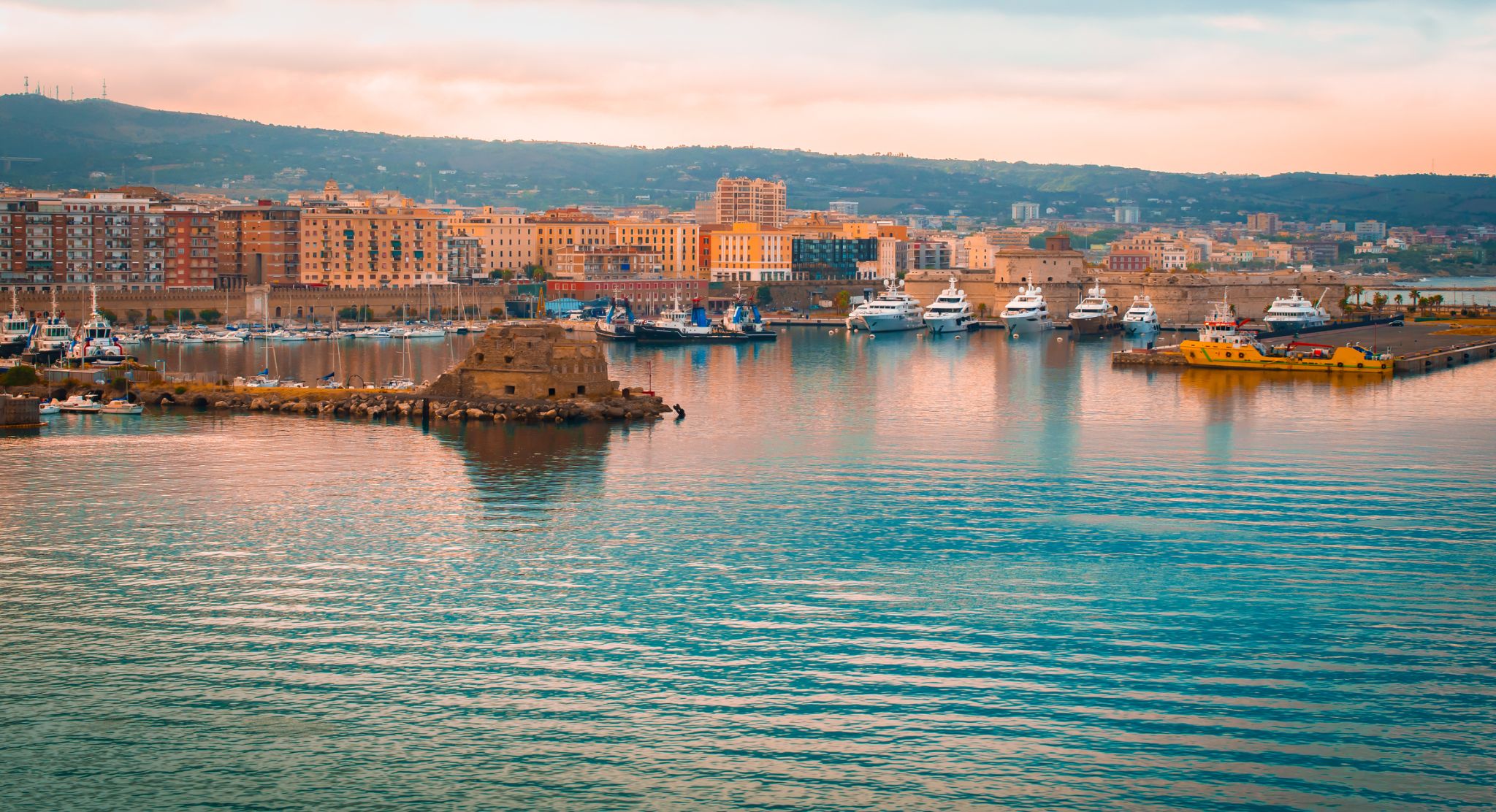 Day 1: 00:00-17:00
Day 1: 00:00-17:00Rome (Civitavecchia) / Italy
Rome is the capital city and a special comune of Italy (named Comune di Roma Capitale). Rome also serves as the capital of the Lazio region. With 2,872,800 residents in 1,285 km2(496.1 sq mi), it is also the country's most populated comune. It is the fourth-most populous city in the European Union by population within city limits. It is the centre of the Metropolitan City of Rome, which has a population of 4,355,725 residents, thus making it the most populous metropolitan city in Italy. Rome is located in the central-western portion of the Italian Peninsula, within Lazio (Latium), along the shores of the Tiber. The Vatican City (the smallest country in the world) is an independent country inside the city boundaries of Rome, the only existing example of a country within a city: for this reason Rome has been often defined as capital of two states.
Rome's history spans 28 centuries. While Roman mythology dates the founding of Rome at around 753 BC, the site has been inhabited for much longer, making it one of the oldest continuously occupied sites in Europe. The city's early population originated from a mix of Latins, Etruscans, and Sabines. Eventually, the city successively became the capital of the Roman Kingdom, the Roman Republic and the Roman Empire, and is regarded as the birthplace of Western civilization and by some as the first ever metropolis. It was first called The Eternal City (Latin: Urbs Aeterna; Italian: La Città Eterna) by the Roman poet Tibullus in the 1st century BC, and the expression was also taken up by Ovid, Virgil, and Livy. Rome is also called the "Caput Mundi" (Capital of the World). After the fall of the Western Empire, which marked the beginning of the Middle Ages, Rome slowly fell under the political control of the Papacy, which had settled in the city since the 1st century AD, until in the 8th century it became the capital of the Papal States, which lasted until 1870. Beginning with the Renaissance, almost all the popes since Nicholas V (1447–1455) pursued over four hundred years a coherent architectural and urban programme aimed at making the city the artistic and cultural centre of the world. In this way, Rome became first one of the major centres of the Italian Renaissance, and then the birthplace of both the Baroque style and Neoclassicism. Famous artists, painters, sculptors and architects made Rome the centre of their activity, creating masterpieces throughout the city. In 1871, Rome became the capital of the Kingdom of Italy, which, in 1946, became the Italian Republic.
Rome has the status of a global city. In 2016, Rome ranked as the 14th-most-visited city in the world, 3rd most visited in the European Union, and the most popular tourist attraction in Italy. Its historic centre is listed by UNESCO as a World Heritage Site. The famous Vatican Museums are among the world's most visited museums while the Colosseum was the most popular tourist attraction in world with 7.4 million visitors in 2018. Host city for the 1960 Summer Olympics, Rome is the seat of several specialized agencies of the United Nations, such as the Food and Agriculture Organization (FAO), the World Food Programme (WFP) and the International Fund for Agricultural Development (IFAD). The city also hosts the Secretariat of the Parliamentary Assembly of the Union for the Mediterranean (UfM) as well as the headquarters of many international business companies such as Eni, Enel, TIM, Leonardo S.p.A., and national and international banks such as Unicredit and BNL. Its business district, called EUR, is the base of many companies involved in the oil industry, the pharmaceutical industry, and financial services. Rome is also an important fashion and design centre thanks to renowned international brands centered in the city. Rome's Cinecittà Studios have been the set of many Academy Award–winning movies.
-
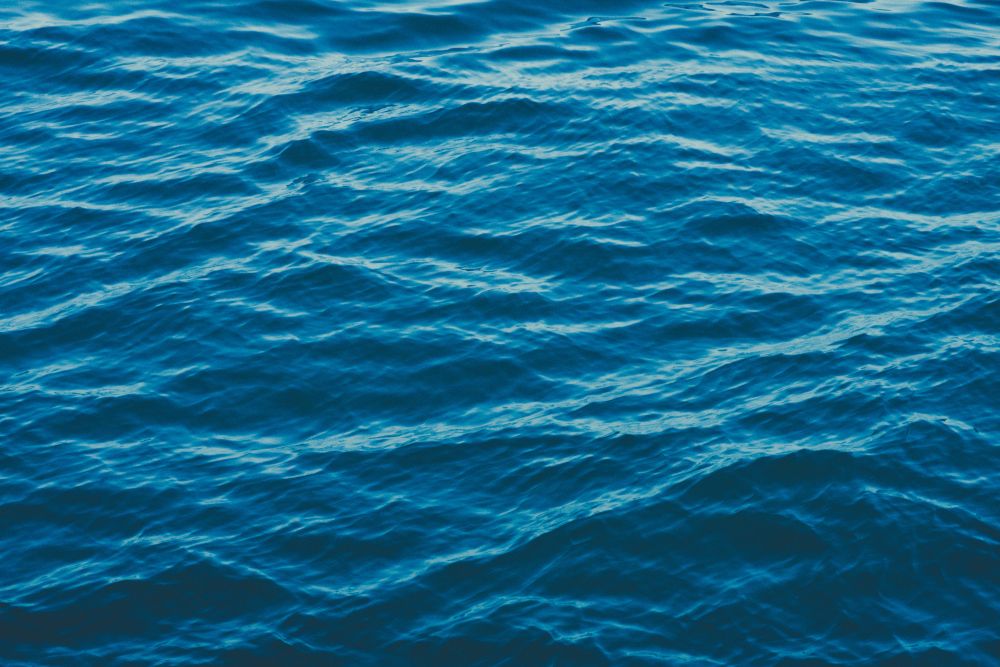 Day 2:
Day 2:Day at sea / Sea
-
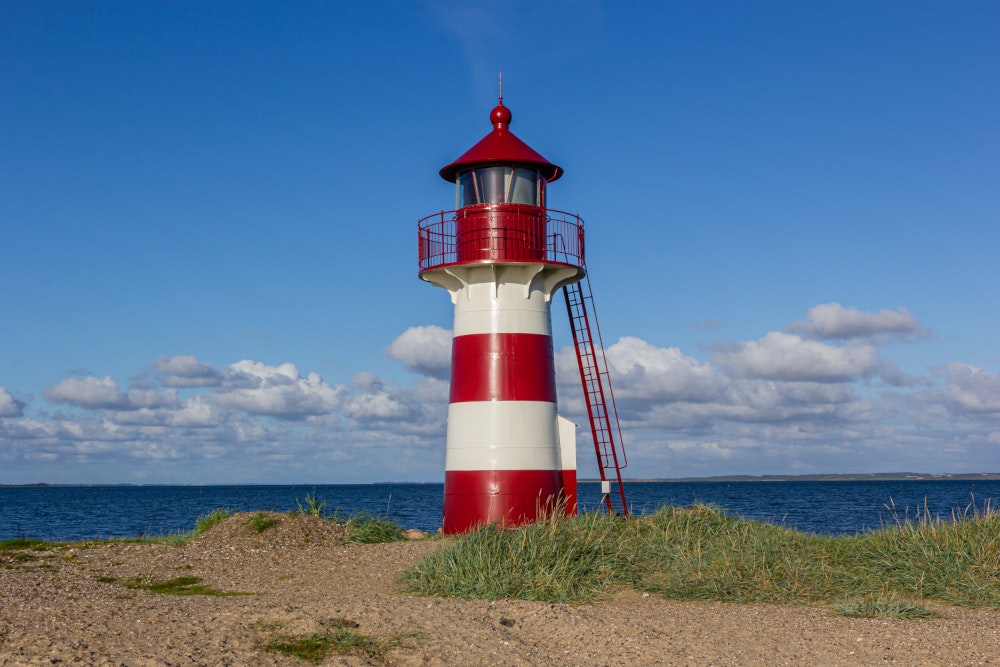 Day 3: 09:00-17:00
Day 3: 09:00-17:00Cartagena (Murcia) / Spain
-
 Day 4: 08:00-17:00
Day 4: 08:00-17:00Málaga / Spain
Málaga is a municipality, capital of the Province of Málaga, in the Autonomous Community of Andalusia, Spain. With a population of 569,130 in 2015, it is the second-most populous city of Andalusia and the sixth-largest in Spain. The southernmost large city in Europe, it lies on the Costa del Sol (Coast of the Sun) of the Mediterranean, about 100 kilometres (62.14 miles) east of the Strait of Gibraltar and about 130 km (80.78 mi) north of Africa.
Málaga's history spans about 2,800 years, making it one of the oldest cities in the world. According to most scholars, it was founded about 770 BC by the Phoenicians as Malaka From the 6th century BC the city was under the hegemony of Ancient Carthage, and from 218 BC, it was ruled by the Roman Republic and then empire as Malaca (Latin). After the fall of the empire and the end of Visigothic rule, it was under Islamic rule as Mālaqah for 800 years, but in 1487, the Crown of Castille gained control after the Reconquista. The archaeological remains and monuments from the Phoenician, Roman, Arabic and Christian eras make the historic center of the city an "open museum", displaying its history of nearly 3,000 years.
This important cultural infrastructure and the artistic heritage have culminated in the nomination of Málaga as a candidate for the 2016 European Capital of Culture.
The painter and sculptor Pablo Picasso, Hebrew poet and Jewish philosopher Solomon Ibn Gabirol and the actor Antonio Banderas were born in Málaga. The magnum opus of Cuban composer Ernesto Lecuona, "Malagueña", is named after the music of this region of Spain.
The most important business sectors in Málaga are tourism, construction and technology services, but other sectors such as transportation and logistics are beginning to expand. The Andalusia Technology Park (PTA), located in Málaga, has enjoyed significant growth since its inauguration in 1992. Málaga is the main economic and financial centre of southern Spain, home of the region's largest bank, Unicaja, and the fourth-ranking city in economic activity in Spain behind Madrid, Barcelona and Valencia.
-
 Day 5:
Day 5:Day at sea / Sea
-
 Day 6:
Day 6:Day at sea / Sea
-
 Day 7: 08:00-17:00
Day 7: 08:00-17:00Ponta Delgada, Fr. San Miguel; Azores Islands / Portugal
Ponta Delgada is the largest municipality and economic capital of the Autonomous Region of the Azores in Portugal. It is located on São Miguel Island, the largest and most populous in the archipelago. The population in 2011 was 68,809, in an area of 232.99 square kilometres (89.96 square miles). There are 17,629 residents in the three central civil parishes that comprise the historical city: São Pedro, São Sebastião, and São José. Ponta Delgada became the region's administrative capital under the revised constitution of 1976; the judiciary and Catholic see remained in the historical capital of Angra do Heroísmo while the Legislative Assembly of the Azores was established in Horta.
-
 Day 8:
Day 8:Day at sea / Sea
-
 Day 9:
Day 9:Day at sea / Sea
-
 Day 10:
Day 10:Day at sea / Sea
-
 Day 11:
Day 11:Day at sea / Sea
-
 Day 12: 08:00-16:00
Day 12: 08:00-16:00Hamilton / Bermuda
-
 Day 13:
Day 13:Day at sea / Sea
-
 Day 14:
Day 14:Day at sea / Sea
-
 Day 15: 07:00-15:00
Day 15: 07:00-15:00Nassau / Bahamas
a port on the island of New Providence, capital of the Bahamas; population 240,000 (est. 2007).
-
 Day 16:
Day 16:Day at sea / Sea
-
 Day 17: 06:00-00:00
Day 17: 06:00-00:00Tampa / USA

